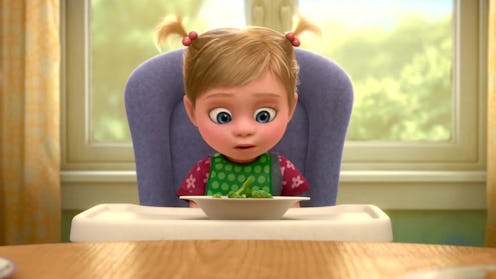Entertainment
'Inside Out' Has The Sweetest Origin Story

If you're not excited to see Pixar's latest film Inside Out just yet, two questions for you: One, how is it that amazing box office numbers and nearly unanimous praise don't sway you? And two do you hate fun? Because seriously, Inside Out is that kind of good. The film, for those who haven't seen it or heard about its unique plot, takes a look into the mind of a little girl named Riley. Inside are five emotions (Disgust, Joy, Anger, Sadness, and Fear), millions of memories, a train of thought, islands of brain functions, and many more surprises. It's a delightful look at the way the child mind works, and it certainly has plenty to say about the way adult minds work as well.
The concept is less neurologically sound than psychologically helpful; it can and will likely easily function as a parenting tool — I can imagine parents coaxing their children to visit Honesty Island or remember that Joy needs a job — which, coincidentally, is actually how the film was initially conceptualized. In an interview with Vulture , director Pete Docter — who also directed Up and Monsters Inc. for Pixar as well — was inspired to make the film by his daughter's emotions. As Docter told the site, his daughter Elie was carefree and silly until she turned 11 — it was at that point that he began to notice her growing quieter and moodier. According to Docter, he made Inside Out to explore that transitional period:
“They’re still children, and they want to be there. But they see adulthood and they want to be there. So they’re completely in this weird, teetery space.”
This is a big deal. While the film possesses a good bit of affection and nostalgia for the whimsy of childhood — which is all personified in the character of Riley's imaginary friend Bing Bong — it does not condemn sadness. In fact, sadness is revealed to be the hero of the story in many ways. This is an incredibly healthy perspective for a parent or child; while joy is great and should be encouraged, sadness is an important part of growing up that shouldn't be ignored or seen as anything other than a normal human emotion.
The film was also partly inspired by Docter's own experience moving from Minnesota (also Riley's home town) to Denmark. He told the Washington Post that he experienced this duality himself:
“It was two things. It triggered my own fears. I was pretty nerdy as a kid, and things stressed me out. I wondered: ‘How do I fit in and what do I say? What are the social things I should do?’ And then, in fifth grade, my folks moved us [from Minnesota] to Denmark. It was all that."
Seeing his daughter experience the same transition made him sad — but then, the film views sadness as a good thing. Inside Out demonstrates that in the same way children should embrace their complex emotions as they grow up, parents should embrace the complex emotions they feel about their children growing.
Even better: Docter's daughter, Elie, gave the film its most important review. "Good movie, Dad," she told him, according to Vulture. High praise from a preteen.
Image: Pixar